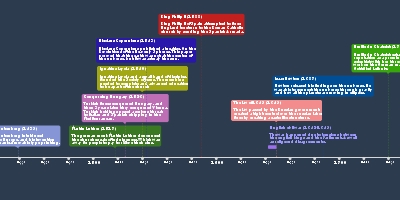Chapter 31
Category: Autre
mise à jour avec succès: 2 août 2021
Auteurs
Created byRishish Narahari
Attachments
Les événements
Loss of Egypt (1798)
The ambitious French general Napoleon
invaded Egypt in hopes of using it as a
springboard for an attack on the British
empire in India. His campaign was a
miserable failure: Napoleon had to
abandon his army and sneak back to
France, where he proceeded to overthrow
the Directory. But the invasion sparked
turmoil in Egypt, as local elites battled to
seize power after Napoleon's departure.Radical Dissidents (1876)
In 1876 a group of radical dissidents from
the Ottoman bureaucracy seized power
in a coup, formed a cabinet that included
partisans of reform, traditions. Many of
them fell out of favor with Abdul Hamid
and spent years in exile, where they
experienced European society firsthand.
Educated subjects came to believe that
the biggest problem of the Ottoman
empire was the political structure that
vested unchecked power in the sultan.
For these dissidents, Ottoman society
wasYoung Turks (1908)
Young Thrks called for universal suffrage,
equality before the law, freedom of religion,
free public education, secularization of the
state, and the emancipation of women. In
1908 the Young Turks inspired an army
coup that forced Abdul Hamid to restore
parliament and the constitution of 1876.
In 1909 they dethroned him and established
Mehmed V Rashid as a puppet sultan.Tsar Alexander II (1861)
The tsar issued the Emancipation Manifesto,
which abolished the institution of serfdom
and granted liberty to some twenty-three
million serfs. This newfound freedom
encompassed the right to full citizenship,
the right to marry without consent, and
the right to own property.Land and Freedom (1876)
A recently formed group called the Land and
Freedom Party began to promote the assassination
of prominent officials as a means to pressure
the government into political reform. In 1879
a terrorist faction of the party, the People's
Will, resolved to assassinate Alexander II,
who had emancipated the serfs and had
launched a program of political and social
reform. After several unsuccessful attempts,
an assassin exploded a bomb under Alexander's
carriage in 1881.Opium War (1839-1842)
Outraged by the Chinese action against
opium, British commercial agents pressed
their government into a military retaliation
designed to reopen the opium trade. The
ensuing conflict, known as the Opium War,
made plain the military power differential
between Europe and China.Boxer rebellion (1899)
In 1899 the Boxers organized to rid China
of "foreign devils" and their influences.
With the empress dowager's encouragement,
the Boxers went on a rampage in northern
China, killing foreigners and Chinese Christians
as well as Chinese who had ties to foreigners.
Confident that foreign weapons could not harm
them, some 140,000 Boxers besieged foreign
embassies in Beijing in the summer of 1900.Trade with Japan (1853)
A fleet of U.S. warships steamed into
Tokyo Bay and demanded permission
to establish trade and diplomatic relations
with Japan. Representatives of European
lands soon joined U.S. agents in Japan.
Heavily armed foreign powers intimidated
the Tokugawa shogun and his government,
the bakufu, into signing unequal treaties
providing political and economic privileges
similar to those obtained earlier from the
Qing dynasty in China.Restricting European Presence (1759)
The Qianlong emperor restricted the European
commercial presence in China to the waterfront
at Guangzhou, where European merchants could
establish warehouses. There, Chinese authorities
controlled not only European merchants but also
the terms of trade. Foreign merchants could deal
only with specially licensed Chinese firms known
as cohongs, which bought and sold goods at set
prices and operated under strict regulations
established by the government.Mutsuhito (1868)
A boy emperor Mutsuhito subsequently known
by his regnal name, Meiji took the reins of power.
Emperor Meiji reigned during a most eventful
period in Japan's history. The Meiji restoration
returned authority to the Japanese emperor
and brought an end to the series of military
governments that had dominated Japan
since 1185.



Comments